Neon Genesis Evangelion is what stopped me from attempting suicide.
Yeah you read that right. That is how I am starting this essay about my favorite work of pop culture. It. Stopped. Me. From. Attempting. Suicide.
The year was 2006. I was in college. I was unsure of my future. I wasn’t yet in the program I wanted to be in. I was unfulfilled emotionally. I was unfulfilled artistically. I was unfulfilled romantically. I was often confused. I was lonely. And I hated myself. I was lost.
I was a full year into my 20s in a new city and I was surrounded by friends… but none of that mattered because on the inside I hated who I was in every aspect. I would regularly stress myself out wondering how I could be so selfish to hurt my friends and family. Those happy people should be out living their lives to the fullest and not be held back by having to waste their time with the awkward, ugly, boring and just plain fucking awful person that I absolutely knew myself to be. I told myself that, “Somehow, I must know the nicest people because they’re spending time with me out of charity, right? I mean they have to know I’m the fucking worst? They should because I know myself better than anyone and I am the fucking worst!”
These thoughts were inescapable. Where could I go to get away from them? They were constantly repeated day in and day out in my voice in my head to an audience of one. The only times I was allowed momentarily reprieves was whenever I was drunk – which was often – when I studiously preoccupied myself with various university projects – also something I dove into very often – or when I fully engaged with a movie or TV series.
I had a subscription to Netflix (back before streaming when it was only a DVD mailing service) so I would distract myself from my own thoughts through drinking heavily and aggressively bingeing a filmmakers entire body of work in short periods of time. If you force yourself to watch most of Alfred Hitchcock’s body of work in three weeks in between school work and college parties that leaves you little time to be left alone with your thoughts so you can knock yourself down. This was my routine for several months. Drinking. Working. Bingeing films. Rinse. Wash. Repeat.
On occasion though, I did break from gorging on various filmmakers and would indulge in a random anime series for the hell of it. So one day in 2006 I needed a break from the work of whatever filmmaker I was obsessing over for the moment and Netflix sent me the first disc of episodes from some random anime series that I had heard was pretty good and had added to my queue as a lark. It was on the night of March 6, 2006 (a Monday night) that I first watched an episode of Neon Genesis Evangelion. It was the night I met this wonderful fucking mess of a character –
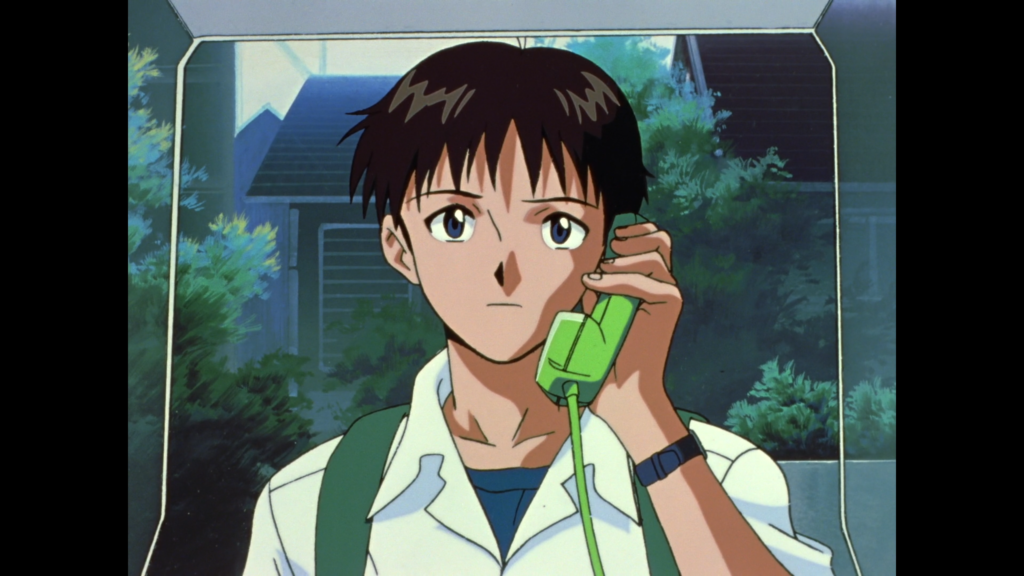
Shinji Ikari. The third Child. The designated pilot of Evangelion Unit 01. The quintessential hero of the story. The eyes through which the viewer is going to experience this wild and intricate sci-fi adventure of giant humanoid monsters being used to fight off other monsters attacking from the sky! Shinji Ikari was the last line of defense for mankind!
He’s also completely broken.
Shinji doesn’t appear so at first though. On first impressions, Shinji Ikari is overall a seemingly well-adjusted 14 year old boy. He’s a little confused by the big sci-fi narrative he suddenly finds himself thrust into, but otherwise he’s just a slightly sarcastic, shy teenager. Slowly though, hints start to seep in that there’s a little more going on with Shinji under the surface.
Instead of his attention being on the giant humanoid creature he’s told he needs to pilot or even the apocalyptic giant monsters attacking from the sky – questions our hero doesn’t even start asking about until the halfway point of the series – Shinji is preternaturally focused on what other people think of him. We learn in short succession that Shinji is quick to self-deprecate and puts his need to feel wanted by others over his own self-preservation.
In the world of Evangelion that means he’ll become a child soldier who pilots a giant unexplained monster and places the future of the world on his fragile and not-yet-fully-developed shoulders. On the surface Shinji is the textbook example of the hero in a young adult/sci-fi/anime story. On the inside though, Shinji is a fragile mess who just needs a hug and some positive affirmation. Over the course of the show the viewer waits for the moment when Shinji will “man up” and save the girl and thus attain self-worth. That’s the arch so many “heroes” go through on their journey and understandably that’s the natural endpoint of a heroes three-act narrative. Neon Genesis Evangelion, in an act of drastic subversion, never gives the audience that story.
Yet, NGE doesn’t only work because it subverts what is expected. Subversion is a good tool and while narratives built around the concept can work on a first watch – what a twist! – more often than not subverting the expected just because can come across as the empty shock value tricks it is. “Oh, I expected the hero to save the day BUT they’ve actually been the villain the whole time! I had no idea how…. wait…. how does that work?”
No.
The reason NGE works is because of its unflinching emotional honesty. Evangelion‘s true subversive talent is that while the show has the polish, world building, explosive action scenes and fun character dynamics – for a series famously known for being about depression there’s a good run of about 5 episodes in the first half of the show that is pure action-comedy gold – NGE is actually an intimate treatise specific to the filmmaker that evolves into being personal expression first and entertainment a distant second.
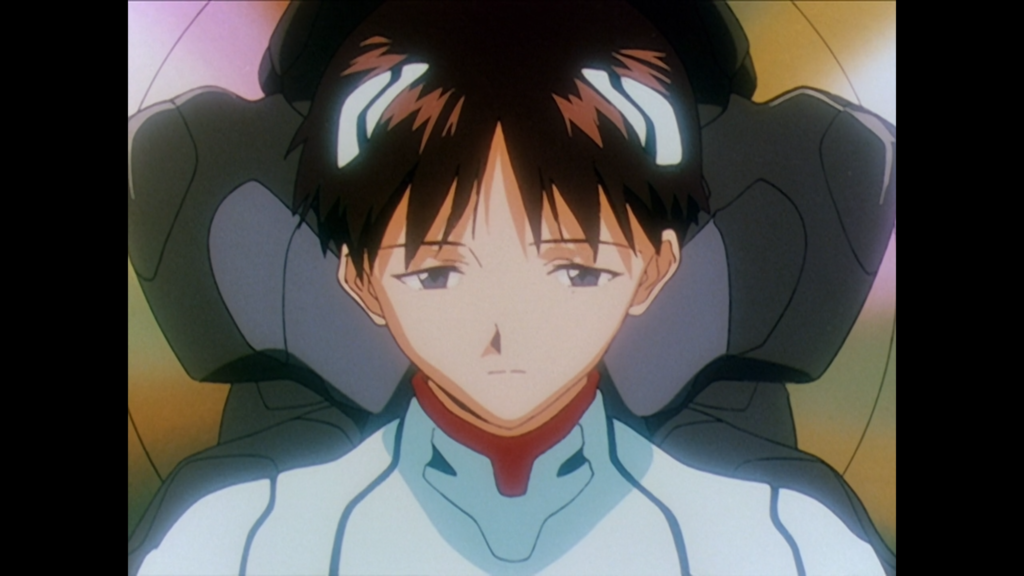
The subversive evolution and, more importantly, the unfathomably real character of Shinji Ikari found me at just the right point in my life. Shinji wasn’t a hero bounding with self-confidence. He didn’t always have a quippy one liner ready so he could save face in every situation. He felt… like a real person. Most protagonists in genre storytelling genuinely act as a sort of wish fulfillment device. We the viewer live the story through the main character and thus associate ourselves with their experience. We imagine that if we somehow found ourselves in their situation, we’d do the same thing because we’re really just like the hero!
A key reason the never-ending onslaught that is the Marvel Cinematic Universe works so well with audiences is because despite the heroes usually being in the wrong – and they are in the wrong so, so often – the films make sure you never notice it. Because the heroes are so goddamn quippy and so goddamn cool they have their shit so together that they never really suffer any long-lasting consequences. And if the heroes ever do suffer real consequences they can just Back to the Future it and reboot history so it works in their favor. Wish fulfillment experiences are a nice escape – and we do need entertainment as pure escapism! Especially in times as insane as right now – but when you’re seriously broken inside those kind of narratives are merely empty calories. It’s good comfort but not lasting.
When I started NGE that night long ago I anticipated an empty calorie experience. I’d see some cool animation and a couple kickass action scenes backed up with a fun cast to keep me watching for 26 episodes and a movie or two. Mind you, NGE does exactly that when it gets going and had it stuck with that fun tone of the first half all the way through to the ending I think the series would hold a place in my heart as the enjoyable sci-fi adventure it originally set out to be.
But, it doesn’t. Because the goal of NGE changed during production.
Far better writers than I have covered the production of this series in detail so I won’t bother beyond a quick summary. Long story short, writer/director Hideaki Anno was an established and successful animation director who in his personal life struggled with a lifelong battle against depression – I’m with you there, brother – and Neon Genesis Evangelion was a concept he came up with and wrote while going through a terribly dark personal spell. When Studio Gainax, the animation studio he helped build and was essentially the go-to director at, needed a new show Anno brought his original idea with him and development began on an anime series centered around the idea of “not running away“. About halfway through production, when episodes were already airing and Gainax had to deal with time and budget problems to ensure they hit every airdate deadline, Anno made the drastic decision to shift the series from the more traditional everything-leads-to-a-big-battle-at-the-end friendly genre pitch it started out as and go for something more intimate and conceptual. He essentially took the subtext the series started out on and turned it into the text.
Neon Genesis Evangelion in my mind is the best example of the weird magic that “the more personal you make a piece of art the more universal it becomes“.
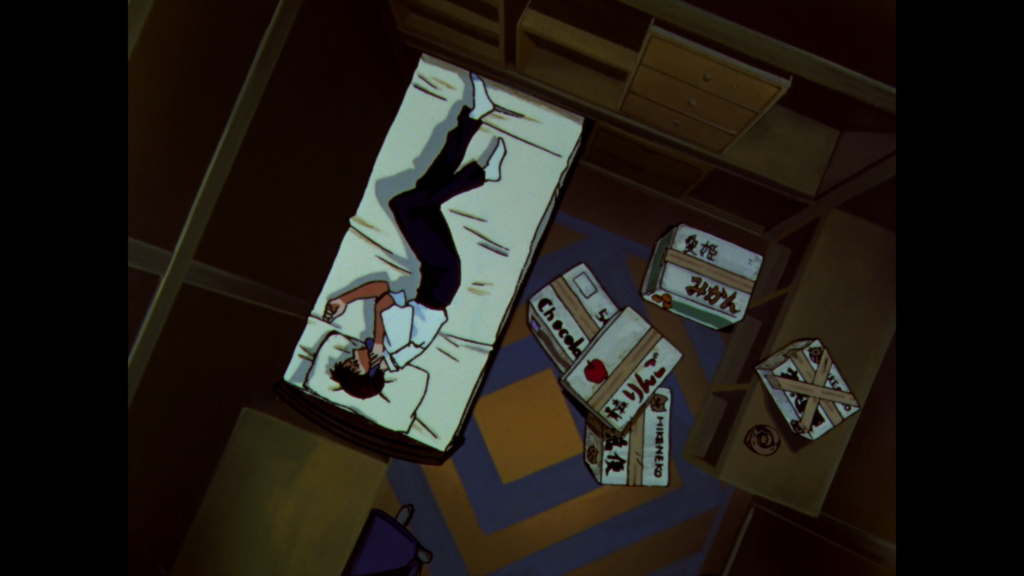
For me, that’s what happened when I first experienced Shinji’s story. His oh-so-specific journey that had nothing to do with my own life – I have never been a teenage boy in a post-apocalyptic world who had to pilot a giant mecha, shock I know – was still frighteningly relatable to my personal experiences.
We’re introduced to Shinji and at first he’s like any other protagonist. He’s thrust into the key role in a world that needs him to exist simply because he’s The One. So far, so traditional. He’s a little more down on himself than the usual protagonist, but clearly this will be a story of a boy learning how great he is and and how he ultimately accepts the title of “greatest pilot ever“. For the first half of the series that is the game Eva seems to be playing. Shinji has a harder time than most protagonists but ultimately he makes friends, he finds a place of contentment in his home life, and he becomes a better, more confident pilot. By the time we reach Episode 15, a little past the halfway mark of the series, Shinji is even making headway with his cold and aloof father. Aesthetically the show has even been getting warmer with a brighter color palette – Asuka brings so many primary colors to the proceedings – and things look like they’re going to be alright.
Then Episode 16 happens…
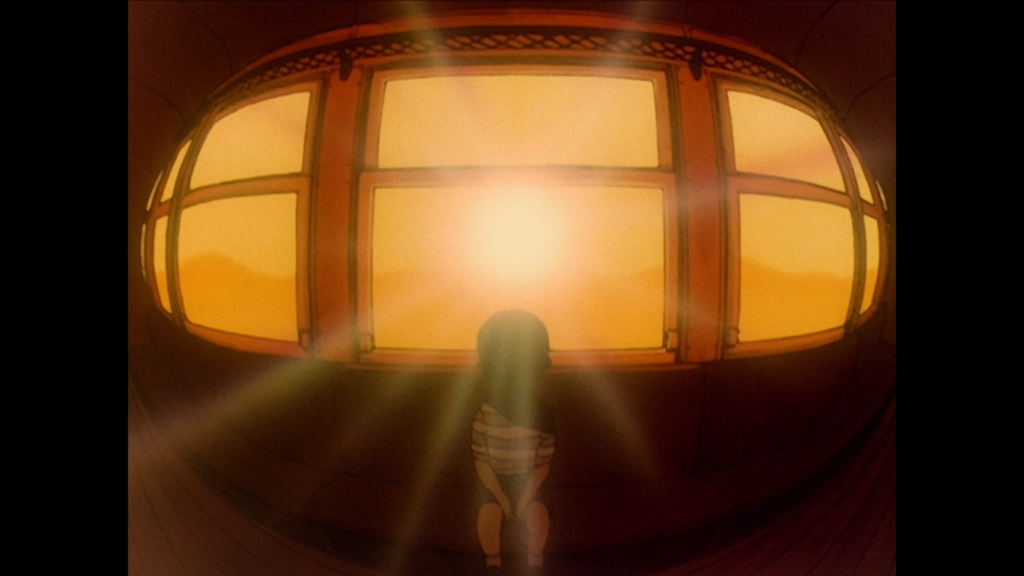
At the start of the episode, Shinji is feeling confident and for the first – and only – time in the entire series he allows himself to be a little arrogant. He’s now number one! But, his sense of bravado is cut short when he confidently charges the next Angel in battle and gets absorbed essentially, into a Sea of Nothingness. The Angel attempts to communicate with him while he’s held captive, but the Angel is so alien a construct that it really ends up being just Shinji having a conversation with himself. “What is a Shinji Ikari?” is the central question asked and for several hours Shinji is locked alone in a dark room with the person he hates the most. Himself.
The rest of the series never recovers from this moment of trauma. In a normal genre narrative Shinji and the show would be troubled and reflective for an episode or two before the character would bounce back stronger than ever having gone through such a difficult experience.
That never happens in NGE. The jokey tone present in the earlier episodes never returns. The battles stop being fun. The various characters start spending more time by themselves and engage in fewer to no casual conversations. Shinji progressively reverts to the more withdrawn individual he was at the start of the show and his support group of friends dwindles away.
Then things around him begin to really spiral out of control. In the third act, when normally all the narrative threads should be coming together, NGE just moves plot elements to the wayside. Aside from Episode 21 which is primarily focused on backstory, the larger world narrative becomes more vague and ill-defined – What did happen to Eva Unit 04? Whose had an Angel hanging around this whole time and why? – while the internal lives of the characters take center focus. This is sounding pretty familiar to those have experienced depression, am I right? Who has time to worry about what’s going on in the outside world when you’re caught in your own fucking head?
Eva keeps on this progressively more internalized story path all the way up to the very infamous end of the TV series. Incredibly divisive since their original airing in 1996, the last two episodes completely abandon the “plot” of Evangelion to focus solely on the “story”. The plot which concerns the Evangelions and the Angels and the evil organizations fighting for control of something called the Human Instrumentality Project aren’t what really matters. Those elements are the fun empty calories of the show. The story about the characters, most importantly Shinji, coming to breakthrough revelations about their inner selves is actually what matters. That maybe… just maybe….
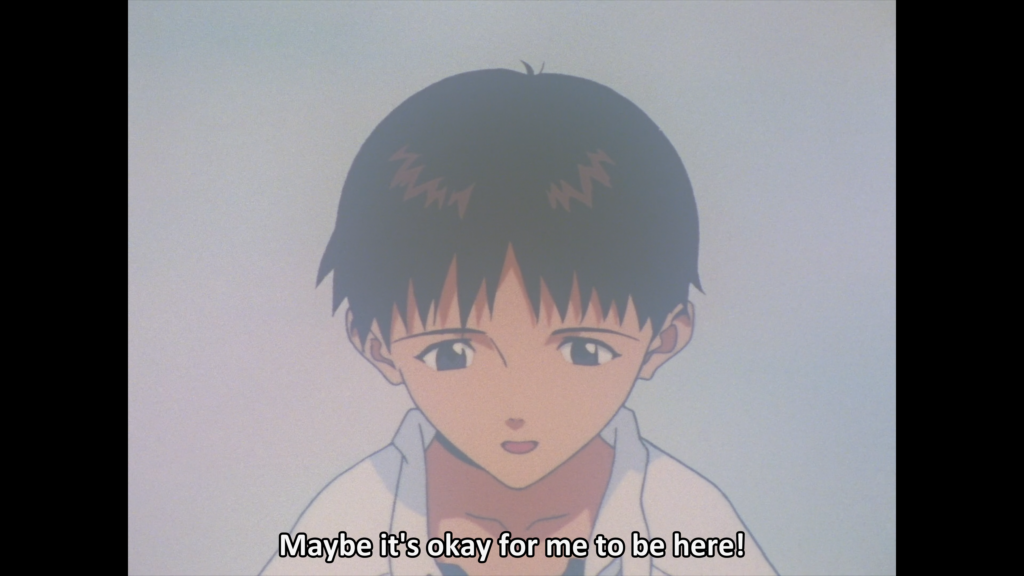
I didn’t know how to take this ending on my first viewing. I mean, I had just spent several hours going on this exciting adventure with this young kid. I was there with him for his whole story. I was there for the highs, like when he had to goofily dance in a giant mecha to win a battle, and the lows, where he was forced to hurt one of his friends in combat, and now you’re telling me the ending of it all was… that it’s okay for Shinji to accept himself for who he is?
Why would…. I mean…. could I do that? Can I accept myself for the mess that I am?
The TV series ending of Evangelion had a resounding effect that snuck up on me I couldn’t quite put together at first. In fact, it was years until the cathartic effect of the TV series ending fully resonated with me. When that happened I actually locked myself up in a bathroom and had a good long cry.
Regardless of my initial thoughts, one undeniable effect the ending had on me back in the mid 2000s was it got me to stop cutting my shoulders open with an X-acto knife as a kind of way to psych myself for “the big cut“. For years, no matter the weather outside, I never dared to wear short sleeve shirts or go to the beach in fear of what people might glimpse if they saw my shoulders. I couldn’t stop though. I wasn’t sad when I had that knife. I was empty. Somehow, the unspoken affect the TV series ending of Evangelion had on me was it got me to stop entirely. I went cold turkey. Never again. There’s only a few scars left on my shoulders now to remind me of that foolishness and I appreciate those scars now because whenever I look at them I’m reminded that:
“Maybe it’s okay for me to be here!”.
It’s a concept I’ve accepted, rejected, reaccepted, struggled with and embraced ever since. And a damn show helped me to see that.
Still, despite the profound affect the TV series had on me, I admit a personal preference for the alternate theatrical ending to the series, The End of Evangelion. The film attains the same type of cathartic revelation that the TV series achieves, but does so while including spectacular action scenes, strong character beats, and some truly awe-inspiring cinematic storytelling! There’s a reason why The End of Evangelion confidently stands alongside Goodfellas and Once Upon A Time In America as one of my three favorite films of ALL TIME!!!
Hideaki Anno’s masterpiece is 87 dense minutes of bleak – yet ultimately uplifting – movie perfection! And somehow Anno is able to properly guide Shinji towards the same moment of personal breakthrough he had in the TV series while also making it crystal clear that he’s not “cured“. That you don’t beat depression. You live with it and with determination and luck you find a way to live a long and happy life contributing to the lives of others despite that dark voice in your head and soul.
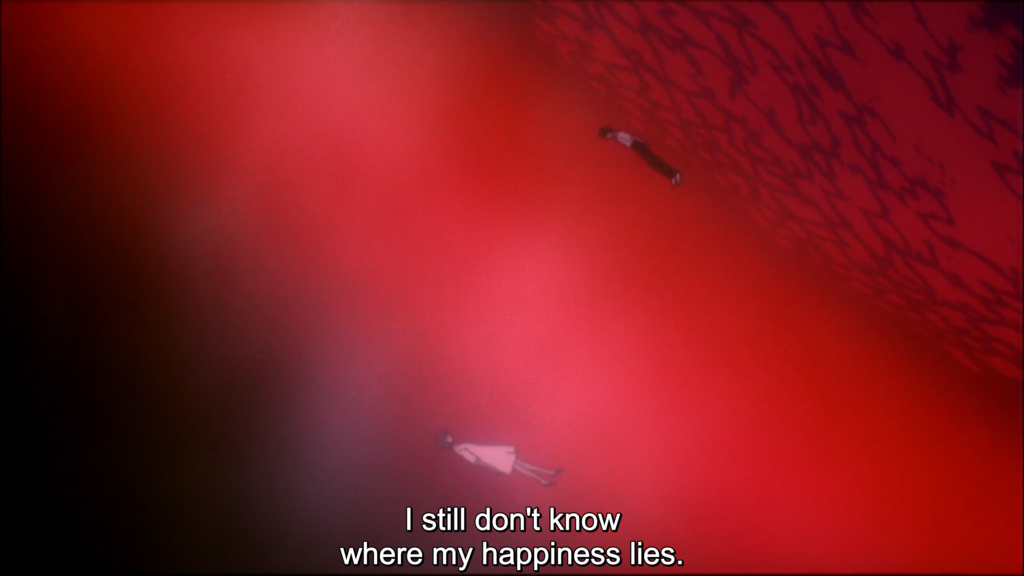
That understanding of the cyclical nature of depression is one of the greatest success of Evangelion in my eyes. “I still don’t know where my happiness lies” is a very astute statement. Too often narratives in pop culture treat depression as a hurdle that can get resolved by achieving a goal. The hero is no longer broken the minute they win the heart of that special girl or that cool guy. The hero is no longer broken the moment they win the Sporty Bowl – I don’t know sports – and the audience cheers their name. Etc etc.
I’m in my thirties now and I’m still working to find out where my happiness lies. It’s a daily struggle to be frank. For example, it’s a foolish thought but I still routinely feel maybe I’ll find fulfillment through the validation of others. Every time I draw and post a piece of art on social media I can’t help but think in the back of my head “maybe this is the one that will get me hundreds of followers and receive thousands of likes thus confirming I’m talented”. That never happens. And after years of posting art I still have almost fewer followers in comparison to other artists on social media and that dark voice in my head asks, “Is it because I’m not talented?” The answer is probably most definitely. That voice also asks “Is it because people don’t like me?” That one seems very unlikely, but I can’t help hearing that voice in the back of my head say otherwise.
Am I going to stop making art though? Fuck no. The few moments where I’m actually drawing something does bring me absolute joy. That joyful feeling is ten-fold whenever I’m writing or directing one of my own project. This (InsaneWhatAmIThinkingWhyAmIDoingThis?) animated short film I’m currently working on is taking longer than I wanted, but I am loving every minuscule step that’s made during the process of creating it. Will I be depressed if I ever finish the film and it doesn’t get seen by many? Absolutely. But, a part – not all but an integral part – of my finding happiness in my own way is just creating to create regardless of the final result. I mean, I’m loving the process of writing this unfocused word salad of Evangelion nonsense and sure, I will likely be let down when only 2 people read it, but fuck it, I’m still gonna post this.
Who knows, maybe one day I’ll unknowingly tap into that elusive magical trick where highly specific personal art hits on something universal like Eva did. Maybe…. maybe…. maybe…
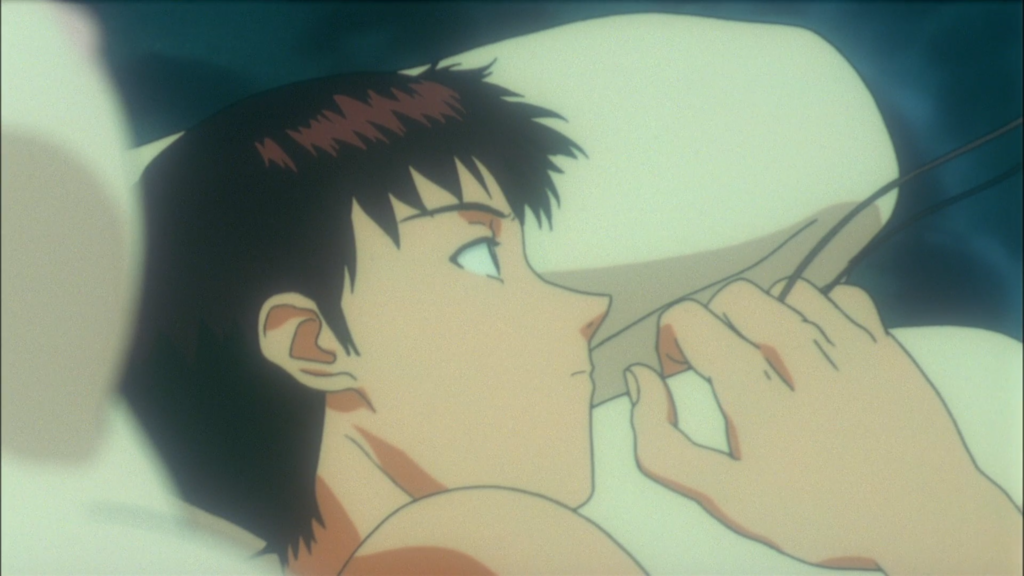
I think it’s time to start wrapping this up. The thing is there’s just so much rich material in Neon Genesis Evangelion to talk about that I’m regretting all the things I haven’t even touched on. I probably should have mapped this post out beforehand, but even if I had I doubt I’d have been able to comment on 1/10th of all the magic present in this very Very VERY dense series. I haven’t mentioned how the world in the show is apocalyptic because of man’s own arrogance and how that framing has only improved 20+ years later as we get closer to the no-point-of-turning-back moment in regards to climate change and how people are just ignoring it.
I haven’t even mentioned the richest relationships Shinji has in the show because each is worthy of its own deep-dive! The parallel journeys of Shinji and the show’s second lead protagonist, Misato Katsuragi, is a wonderful example of how characters who couldn’t seem more different from each other on first appearance are revealed to have far more in common than first thought. There’s his cold yet also warm relationship with Rei Ayanami . Don’t forget his volatile friendship with Asuka Langley Soryu. She’s a fan favorite and their interplay is one of the best elements of the series! Now while I don’t agree that they’d work as a romantic couple – a Shinji and Asuka pairing I feel would always end up a toxic one – I do think they complement each other well as friends, and Asuka’s story tragically shows how extroverts use dynamic personalities to cover up their own inner demons.
There’s also the intense one-episode emotional reprieve that Kaworu Nagisa provides for Shinji and how for one moment our hero is presented with the very attractive illusion that the love of another person can make everything alright. That’s a fallacy though because love can’t save you if you can’t stand on your own two feet.
There’s just so much to talk about! I’m geeking out! Ultimately, each one of these characters has a fully realized inner life and each one of those inner lives worked as an authentic way for Hideaki Anno and his creative team to express how we as humans are all our own little worlds that need to be self-sufficient to survive, yet paradoxically also need a community to truly exist. It’s a wonderful cast in my favorite work of visual art!
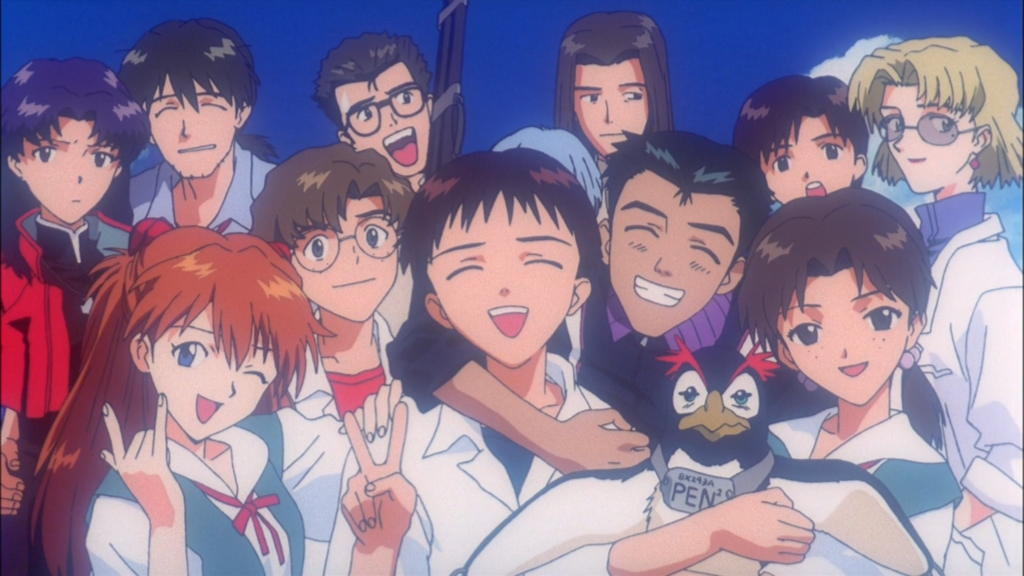
ONE MORE FINAL: I’ve made it a tradition to revisit NGE once a year and have done so since 2006. What’s been fascinating to watch is how my relationship towards Shinji and all the other characters changes on a year to year basis. When I first saw this show, I was closer in age to the young child pilots so I related to them more immediately. As I’ve entered new stages of my life I’ve found new appreciation and understanding for other characters in the show. I now find myself uncomfortably familiar with the plight of Ritsuko Akagi, the head of NERV’s science team. Ritsuko by all outward appearances has her act together, but like everyone in Eva, behind that surface is a lonely woman in her late 20s/early 30s who fills her life with work as a way to keep the emptiness at bay. She’s so in need of human affection that when given the chance for sex and intimacy – with a character who does not respect her at all by the way – she latches onto it with a ferocity and neediness that is desperate and tragic. I hadn’t experienced that type of relationship neediness when I first saw the series and thought her character was cold and unemotional. But over a decade later I’ve gone through Ritsuko’s experience and now find her character much more heartbreaking and intensely sympathetic. This journey of rediscovery and enlightened re-experiencing of this cast has happened with almost every single character in NGE. I could happily do a whole essay on almost every character with ease. Who knows, maybe one day years from now I’ll even find myself sympathizing with Gendo.
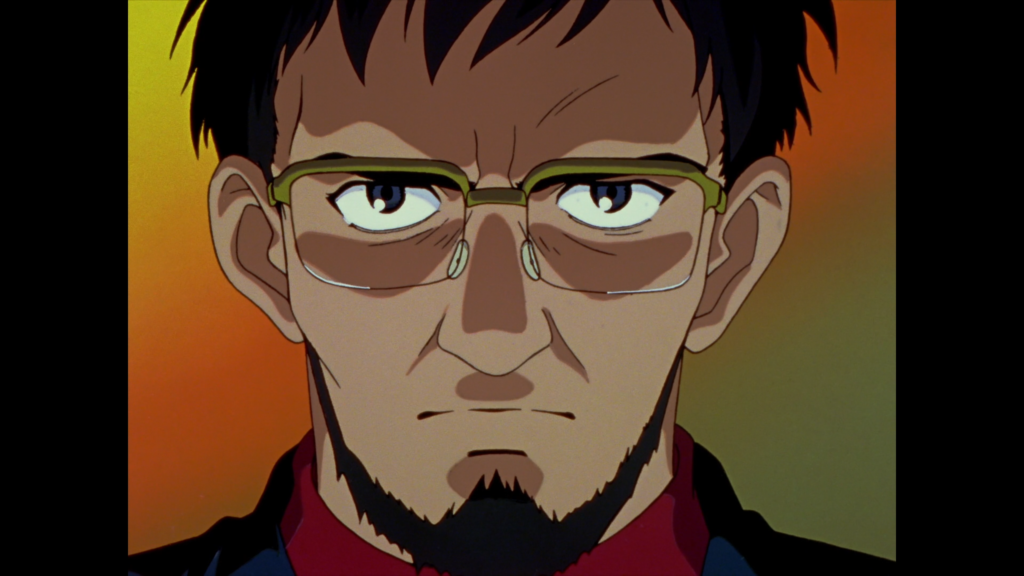
The journey of the series isn’t over though. One day I’ll write about the four part Rebuild of Evangelion film series. With the first film released in 2007 – a mere year after I became addicted with this series – the four planned films retell the story of Neon Genesis Evangelion with a bigger budget and many drastic changes made to the overall story. By the third film, 2012’s Evangelion 3.0: You Can (Not) Redo the movies have almost completely removed themselves from the iconography of the original series. Except, that is, for Shinji Ikari who still remains his conflicted and oh-so-human self.
Despite the fan community feeling disappointed over some matters – mainly the movies having some intentionally vague world building and fan-favorite characters like Asuka being moved to more traditional supporting roles – I feel the Rebuild films to date have been an excellent continuation of the themes of NGE with a reaffirmation that self-doubt and hatred is a cyclical problem that is never truly erased and can take shape in any form. Maybe once I see the final movie, currently scheduled for a release in the year 2020, and can experience the entire four part saga as a whole I’ll write another openly personal essay about what Shinji’s tragic, but oddly uplifting, four-film journey of self-discovery means to me.
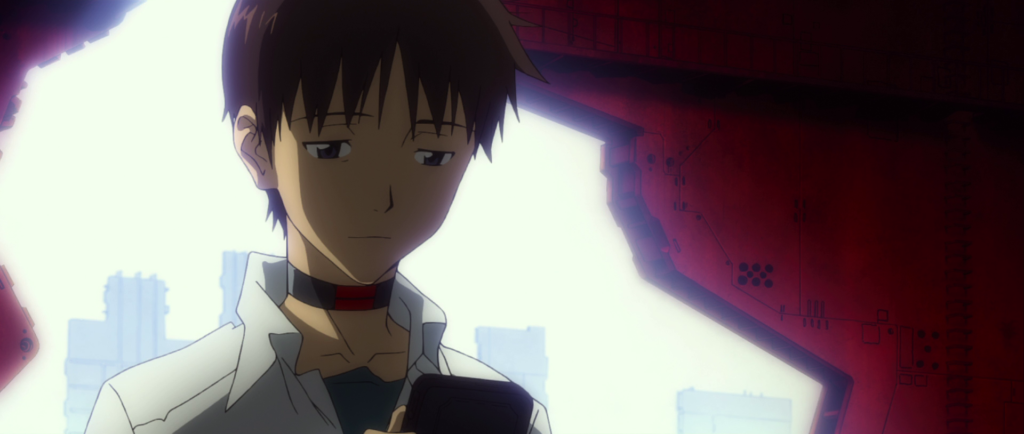
In the meantime though, the complete masterpiece that is Neon Genesis Evangelion is currently available on Netflix. If you’ve never seen the series before I don’t think you’d be shocked to hear me say you should give it a watch. It might deliver something truly remarkable for you. Or it might not. We all experience art differently. If you have seen Evangelion before, whether you liked it or not, I think you should maybe give it another watch. The series deserves it.
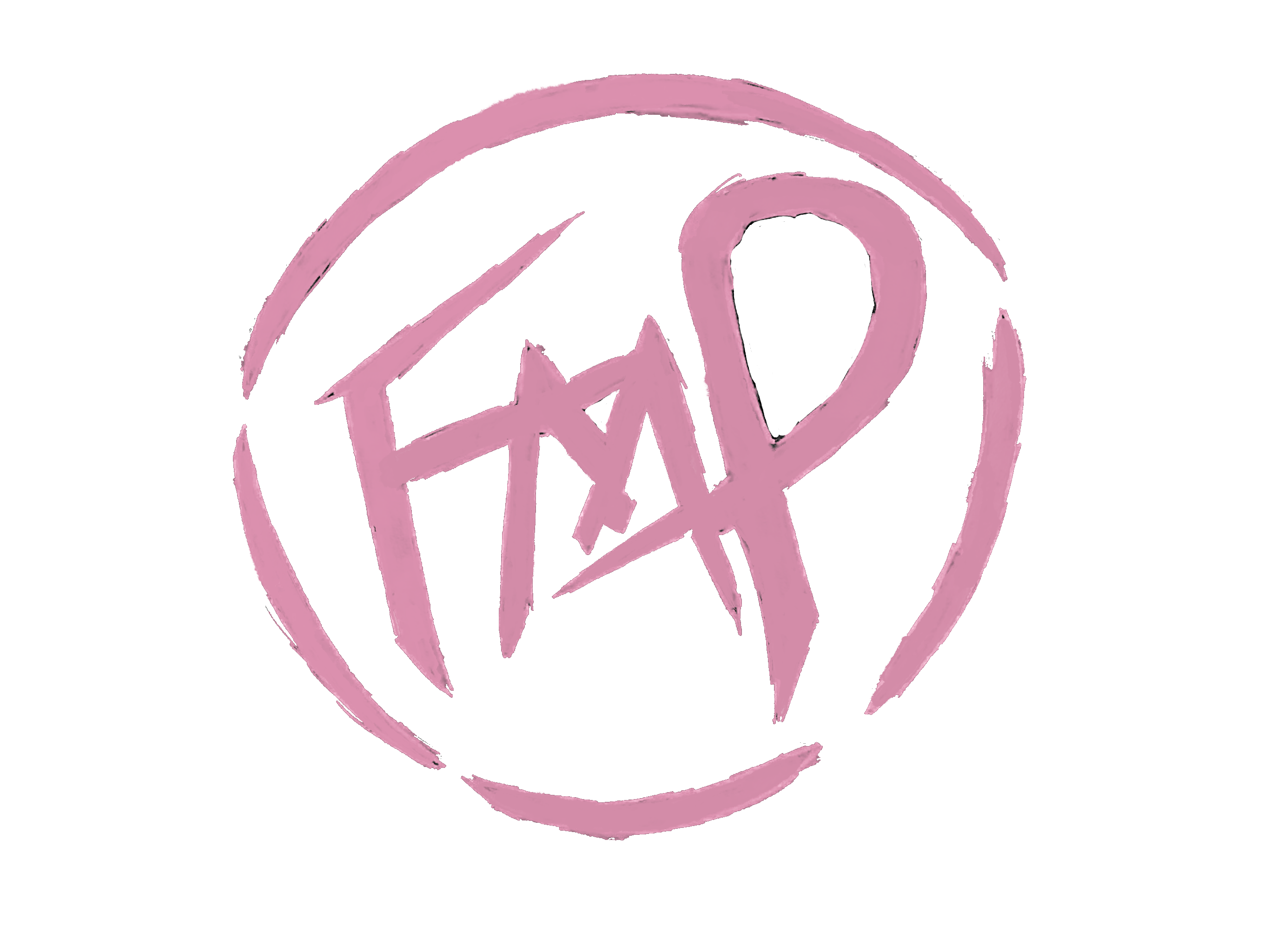
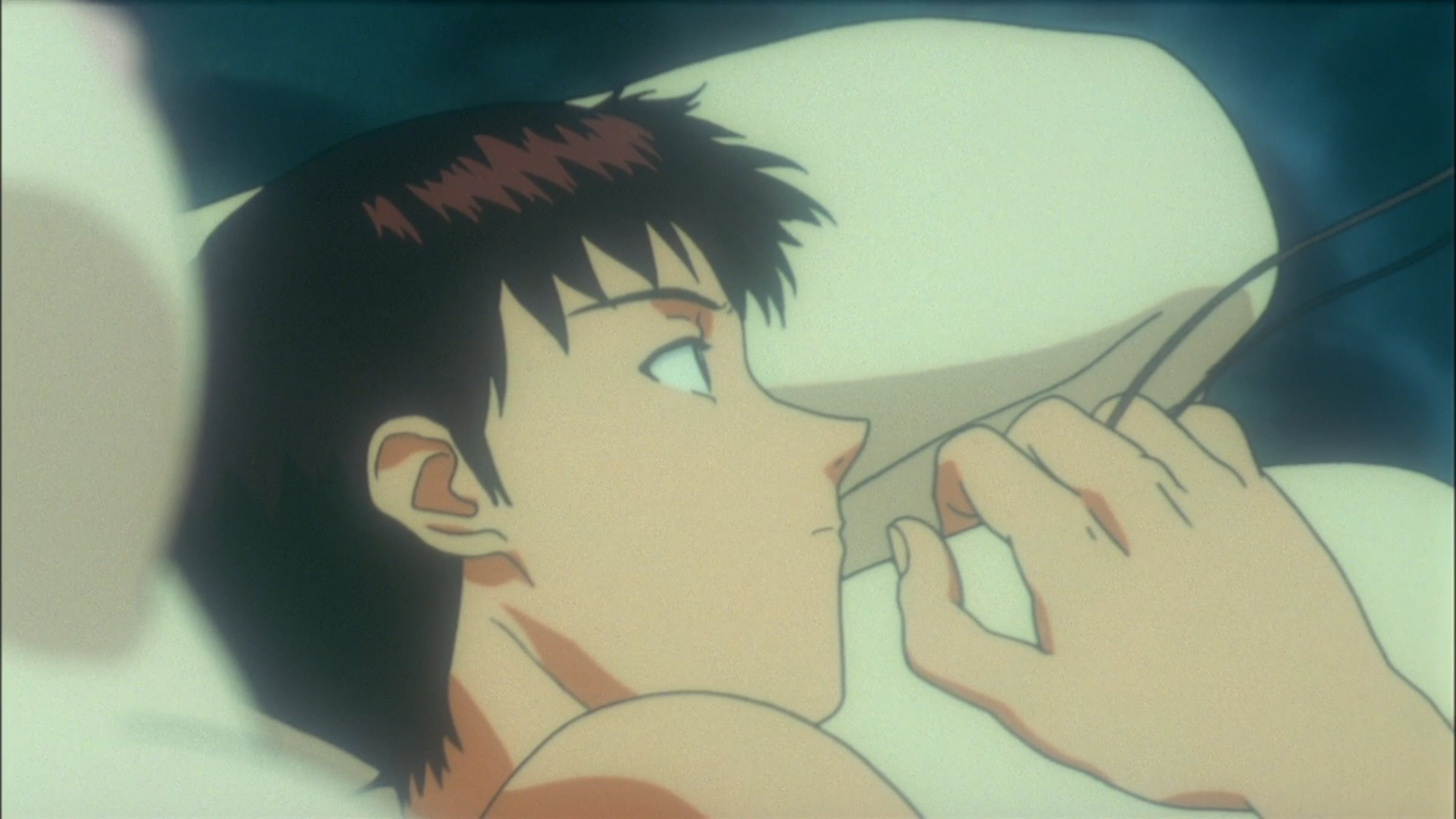
One response
[…] Genesis Evangelion saved my life when I first saw it in 2006 – https://paul-hugins.com/2019/06/26/neon-genesis-evangelion-the-broken-beauty-of-shinji-ikari/ – and shortly after I discovered the series Studio Khara was formed by the original series […]